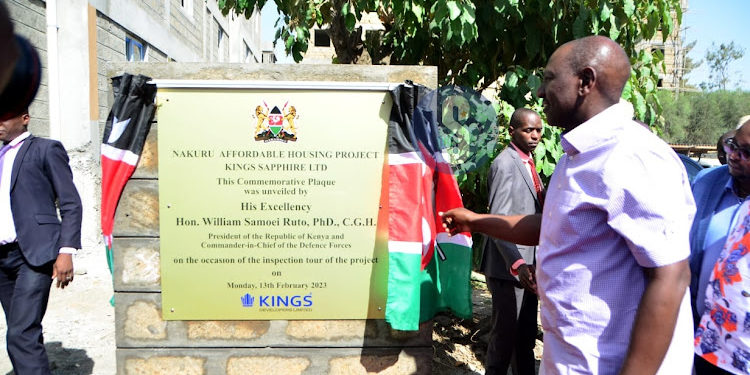President William Ruto’s commitment to affordable housing in Kenya, a central aspect of his electoral agenda, is encountering skepticism and scrutiny. The recent delivery of the Buxton Estate, a flagship project launched in 2021, has sparked concerns regarding potential self-serving practices that may compromise the Affordable Housing Program (AHP) as a whole.
Senator Chute Mohamed of Marsabit, a member of the Parliamentary Committee on Roads, Transportation, and Housing, has expressed reservations about the authenticity of the AHP. In a recent Assembly session, he criticized the government’s practice of providing land for projects without charge, only to sell resulting properties at prices deemed unaffordable for the average Kenyan citizen.
Senator Chute raised questions about the calculations behind this strategy, highlighting a significant gap between the government’s generous contributions and the apparently high market prices of the completed housing units.
Specifically citing the Buxton project in Mombasa, Senator Chute alleged that, despite being built on government-provided land and enjoying tax incentives, the housing units were being sold at prices significantly exceeding their market value. He suggested a potential fraudulent scheme, emphasizing the disproportionate profits made by developers in comparison to Kenyan landowners. He also warned of potential long-term consequences, including the depletion of government-owned lands intended for development.
The criticism escalated when Mombasa residents filed a petition expressing concerns about the affordability of the housing project in their area. Disturbed by the perceived disparity between government incentives and final property prices, residents brought their grievances to the attention of the Senate committee.
An investigative report by the Roads, Transportation, and Housing committee faulted the Mombasa County government and the developer, Gulf Cap Africa Investment Partners Ltd, for a deal that favored the developer over the rights of former tenants. The report highlighted concerns about the negotiation process, alleging that the county failed to adequately protect the interests of former residents of the estate. The committee recommended the surrender of some units to former tenants, prioritizing those who had been promised but had not yet secured new homes. It also criticized the county for negotiating a lower number of housing units than the original tenants in the old estate, emphasizing the need for a fair tenant purchase scheme.
The Senate committee’s report further exposed inconsistencies in the cost of housing units at Buxton Estate, with the cost per square meter for one-bedroom, two-bedroom, and three-bedroom units exceeding the standards set by the AHP. These revelations raise questions about the transparency and adherence to the affordable housing framework outlined by the National government.
In response to these issues, the Senate committee made several recommendations, including the priority allocation of units to former tenants, a review of the negotiation process, and the establishment of statutory instruments to guide county governments in engaging the private sector for housing development. These concerns highlight potential self-serving dealings that could undermine the credibility and success of President William Ruto’s affordable housing promise. The government’s actions in addressing these issues will shape the future of the initiative and its ability to genuinely address the housing needs of ordinary Kenyans.


















